Welcome to “The Journey”, a newsletter from my little corner of the internet!
In this issue, I’m continuing to discuss the topic of “could you move from North America to Europe”, first raised a few months ago in a thought-provoking post by Gregory Garretson. The question this week is, “Are you ready to put in the hard work of learning a new language?”
Well, are you?
“The Journey” is a reader-supported publication and arrives in your inbox every second Sunday for free! And if you wish, you can opt in for a paid subscription ($5CAD/month or $50CAD/year), and you will receive a surprise item in the mail as a “thank you”!
Life at Large (This section has been temporarily commandeered to discuss the query “could you move from North America to Europe?”)
“Are you ready to put in the hard work of learning a new language?”
When Michal and I began planning our first trip to Portugal, we both downloaded a language app to get a head start on learning Portuguese. We made the same mistake many before us have made–the app we downloaded taught Brazilian Portuguese, not European Portuguese.
Now let’s be clear, at the level of competence we achieved on that app, the fact that it was not European Portuguese can hardly be considered a setback.
Realizing our mistake, we switched to Drops language app, and diligently worked through its activities. By the time we moved in 2023, the app celebrated the milestone of exposing us to 900 Portuguese words. I can confirm, being exposed to words, and actually remembering them are two very different things.
Similarly, being able to read basic text and understand a real-time conversation are not the same thing. Despite our efforts, we arrived in Porto functionally able to communicate little more than pleasantries in Portuguese.
We weren’t concerned–surely, immersed in the language every day, we would improve quickly, right?
Nearly two years later, we’re still struggling with basic sentences. It turns out moving to a city like Porto didn’t immerse us in the language. Many people we encounter in a usual day speak English and respond to us in English, even when we initiate the conversation in Portuguese. I know–we could persist, but we haven’t. We have been offered the easy way through, and we have been taking it. We are not proud of it.
The emotions I have experienced over the last year as we take weekly language lessons with a tutor have been a rollercoaster. First, frustration with myself for being so slow. Then, embarrassment over my poor pronunciation. And most recently, shame–shame that I’ve been here almost two years and still can’t hold a meaningful conversation in Portuguese.
As you might imagine, none of those emotions provide an optimal backdrop for learning.
You might ask, why am I so focused on learning Portuguese when so many people speak English and I can “get by” without being competent in the language?
Respect and Acceptance – Learning the local language shows I respect Portugal and its people. It demonstrates I’m invested in being part of the community rather than just an outsider.
Everyday Convenience and Independence – From grocery shopping to dealing with government paperwork or healthcare appointments, knowing the local language would make life smoother. Sure, people are quick to switch to English or use a translation app, but I want to be competent enough in Portuguese to look after “life admin” in the local language.
Career Opportunities – I’m not looking for a traditional job, but even advertising photoshoots feels risky when I can’t communicate fluently with potential clients.
Stronger Social Connections – While we have made local friends who speak English, speaking Portuguese will make it easier to bond with neighbours, and people we meet regularly in the community, making our experience here much richer.
Deeper Cultural Integration – Language is a gateway to understanding the culture, traditions, and values of a new place. It allows us to connect more meaningfully with locals and appreciate nuances that would otherwise be lost in translation.
As time goes on, I have become increasingly aware of the last point. In Canada, when I walked down a street, sat in a cafe, or took transit, I overheard bits of conversations around me. They were a temperature check on daily life, signalling what was on the collective social mind. Here in Porto, I can’t understand much of the conversation around me, and I’m missing the sense of being connected to the broader community.
Last week we interviewed a guest, Alex, for an upcoming Relocurious podcast episode. After the recording, we discussed language, as English is not his first language. He described moving to an English-speaking country as having a kaleidoscope of thoughts and ideas, but only two colours to express them.
That’s exactly how I feel. I fumble for the right words, swap verbs for ones I actually know, and by the time I finish a sentence, it barely resembles my original thought.
Recently, Michal and I recommitted to learning Portuguese, and we revisited some of the practical strategies that people have had success with:
Language Apps – These are a great place to start to learn a bit of vocabulary, but you likely won’t become fluent using them without additional resources.
Structured Classes – Enrol in local courses at a language school or online platforms for personalized lessons. In Portugal there are private languages schools, and government sponsored classes.
Hire a Tutor – We have a tutor we meet online once a week. We recently changed tutors, and it’s making a big difference.
Language Meetups – Platforms like Meetup, or InterNations can connect you with locals and fellow learners for real-world practice.
Practice Daily Conversations – Challenge yourself to order food, ask for directions, or make small talk in the local language. Even if locals switch to English, persist in speaking their language–I’m working on this. I do feel quite proud of myself when I can get through a whole errand speaking only Portuguese.
Engage with Media – Watch TV shows, listen to podcasts, or read simple books in the language to improve comprehension. I have found a few YouTube channels that talk about current events in clear language. I don’t always get it all the first time I listen, but I’m improving.
Be Patient and Consistent – Progress takes time. I’m trying to celebrate small wins and keep pushing through frustration.
From experience, I can say, learning the language isn’t just about communication—it’s about belonging. Getting here was easy, but really feeling like we belonging is proving to be much more challenging. We are up for the challenge!
In the next edition of The Journey, we will dig into the question: Are you sufficiently familiar with the country you plan to move to?
Previous post | Next post | Start at the beginning
Projects and Events
I know I have been going on about it, but I’m excited–it’s only four days until the opening of the Cluster-London Photography and Print Fair! I have received confirmation that my prints have arrived, and in two days Michal and I will go and get to work installing my contributions to the exhibition!
If you have missed it, here are my responses to interview questions I was asked as we were preparing for the exhibition.
If you will be in London UK April 10-13th, you can RSVP to come see the exhibit (tickets are free) here.
Another exciting project has been keeping Michal and I busy–Relocurious!
We are building a community for people to explore the emotional side of moving abroad. We have been talking with guests and recording episodes for our podcast, compiling resources, and writing articles to help people think about the experience of moving across borders, beyond the visas and logistics.
We have started from scratch, so we are floored to see our podcast–with only two episodes up so far, has been downloaded in 18 countries, on seven different podcast platforms! Wow.
Although we are still finding our feet with this project, we do feel we are on the right path. Several of the guests we have interviewed in the last few weeks have expressed how much they valued pausing to think back through their experience, to reflect, and appreciate all they have experienced in their journey. Michal and I have been reflecting on our own journey with relocating as well, and it has been refreshing and energizing.
If you are interested in hearing people’s stories and experiences of moving across borders, we’d love to have you follow along!
Writing
For the last month I had been quite stuck when it came to writing my dad’s story. I had plenty of interview notes, easy access to my dad and his older sister, and all the information I needed to get going. But actually writing the first chapter? I just couldn’t get started.
Every day, I thought about the Norwegian word "dørstokkmila," which translates to "doorstep mile"—the idea that the first step is always the hardest. And it certainly has been.
Finally, last week, I asked myself why. Why was this project so much harder than past ones?
Staring at a jumbled Word document, I had a realization—I had abandoned the very process that had worked for me before.
Why was I using Word? I had already set this project up in Scrivener, the tool I rely on for big writing projects. Word isn’t bad, but for something with loads of interview transcripts, notes, an outline, and a timeline, for me, Scrivener works much better. It keeps everything organized in one place, letting me click between resources without opening multiple files.
Even more importantly, Scrivener lets me set project goals—overall word count, deadlines, daily targets, and I need those. Metrics keep me moving. Just ask my Fitbit!
Of course, writing should be about the joy of the process, and most of the time, it is. But to keep my butt in the chair and words flowing, I need that extra nudge. My past projects proved that.
So how did I end up back in Word? I realized it happened while editing Mom’s story. I had been exporting chapters to Word for her to review, leaving final versions there instead of updating Scrivener. Without noticing, I drifted away from the system that worked best for me.
Once I caught that, I switched back. And just like that, the words started pouring out. There is still a LOT of work to do, but I have started, and that is the main thing!
By the time the last chapter of Mom’s story is posted in about a month, I should have the beginning of Dad’s ready to go.
If you missed the latest chapter of Mom’s story, here it is:
Chapter 17 - Melting Snow, and Other Work-Arounds
Trish was surprised by how far she’d wandered from the clinic, bucket in hand, without finding any clean snow to melt for water. Scanning the ground for an untouched patch, she wondered aloud just how many dogs lived in this tiny village.
Photography
Last weekend the sun shone, and a friend invited us out for a photowalk. It was a lovely afternoon. We walked through little side streets, we chatted, and we took photos. That’s a great afternoon, in my opinion.
I didn’t get anything that will stop you in your tracks, but here are a few of the sights I saw last Sunday in Porto:
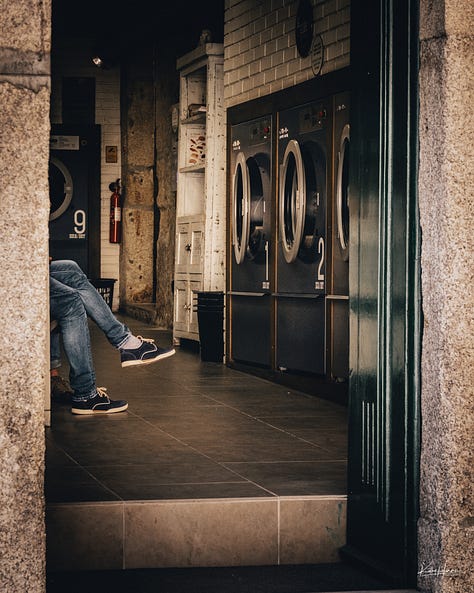
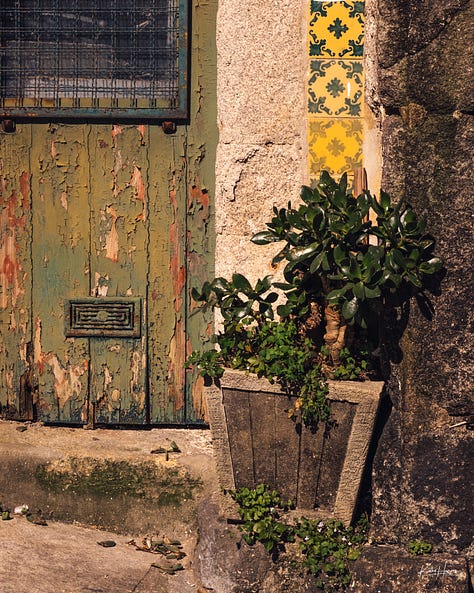
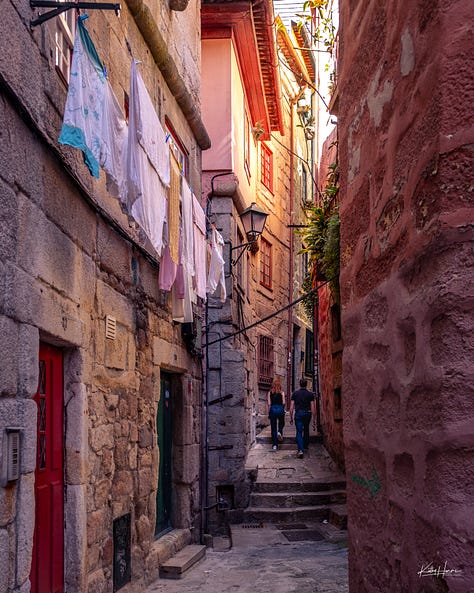
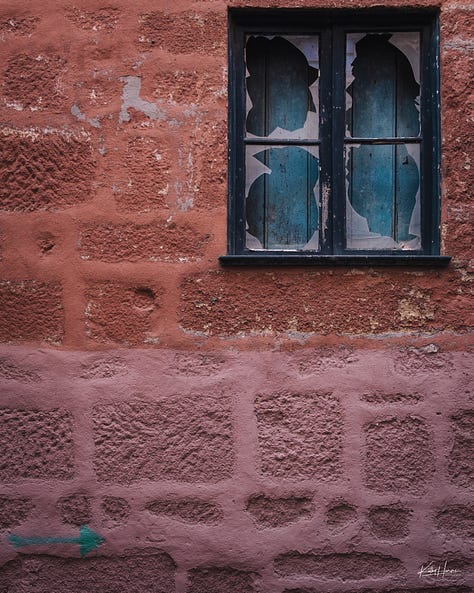
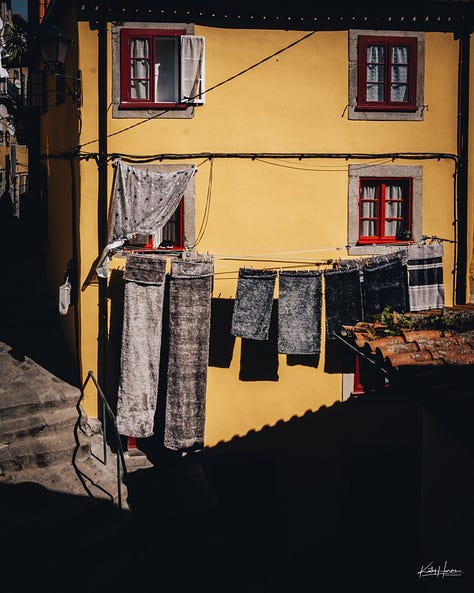
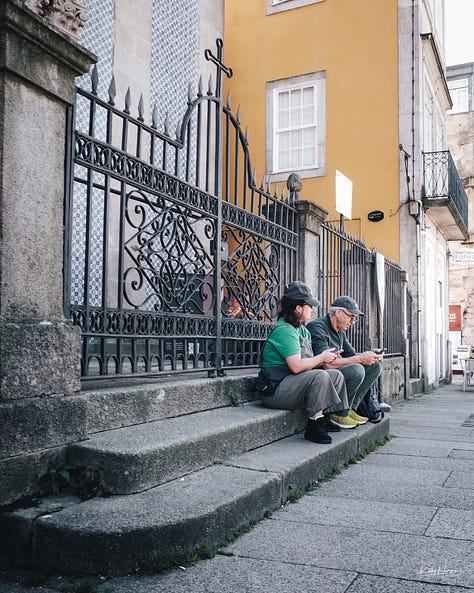
On April 5th, a small but mighty group gathered in Porto to support the #handsoff protests that were happening all across America that day. I’m not great at making catchy signs, but I wanted to help amplify their voices through photography, so I attended with my camera, and documented the event. Here are a few photos from the afternoon:
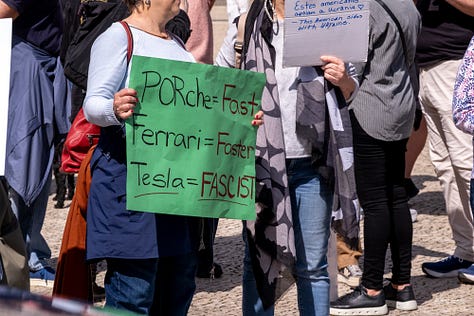



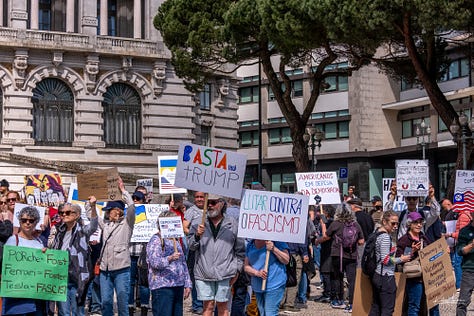
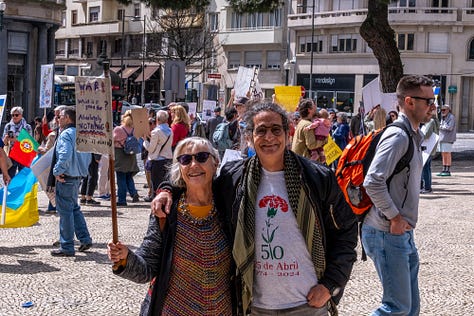
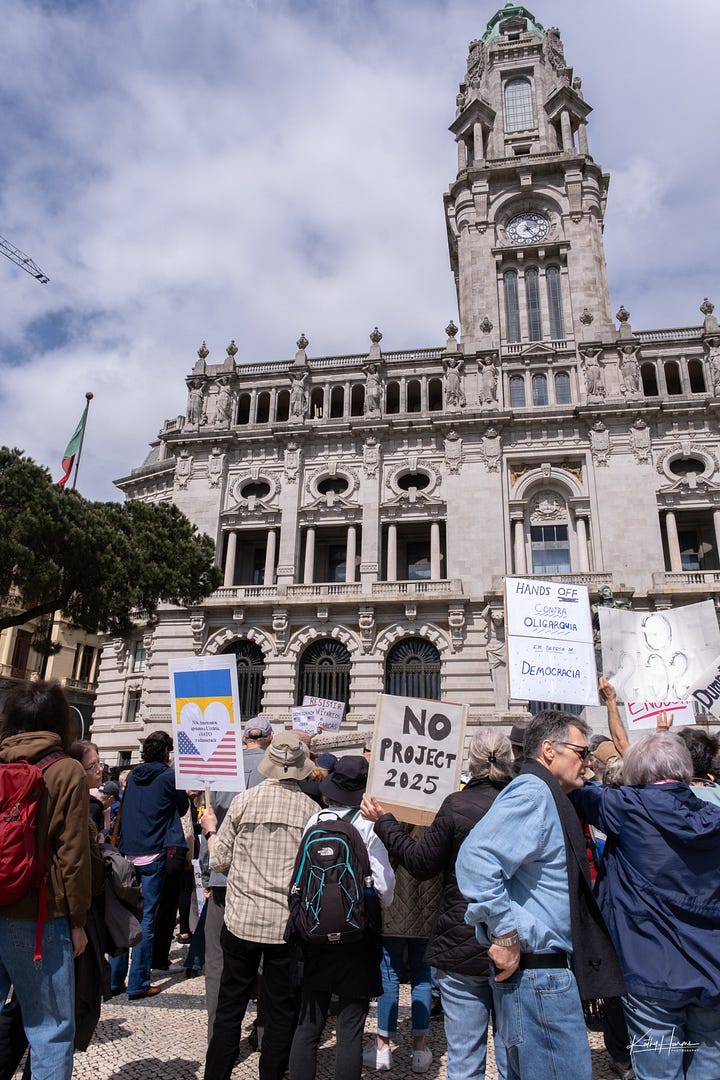

Last Thoughts
Thank you for following along as I share odds and ends from life and creative pursuits, and to those of you who opted in for a paid subscription, THANK YOU! There is a small token of my gratitude on its way to you in the mail for new paid subscribers.
There is also a little “bonus” at the end of this newsletter for paid subscribers. This week it’s a short video sharing some details that I would normally include in the “Life at Large” section, which has been temporarily repurposed for the discussion about relocating.
As always, I love hearing from you - your comments, questions, suggestions, or just a quick hello. They are all very welcome!
Até à próxima! (Until next time!)
Kathy
Keep reading with a 7-day free trial
Subscribe to The Journey to keep reading this post and get 7 days of free access to the full post archives.






